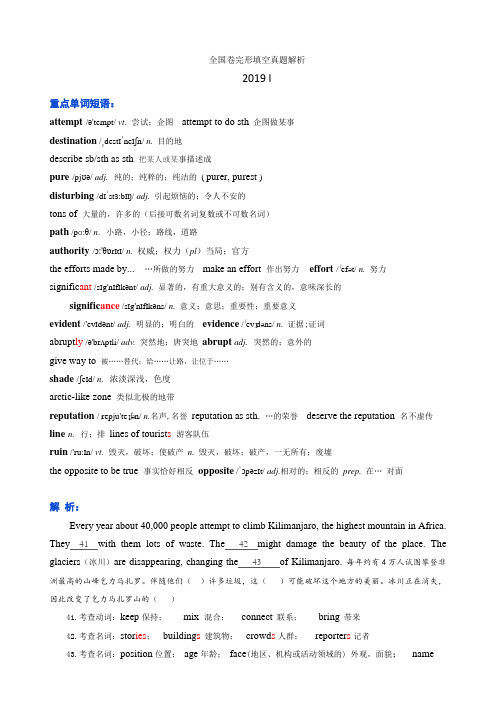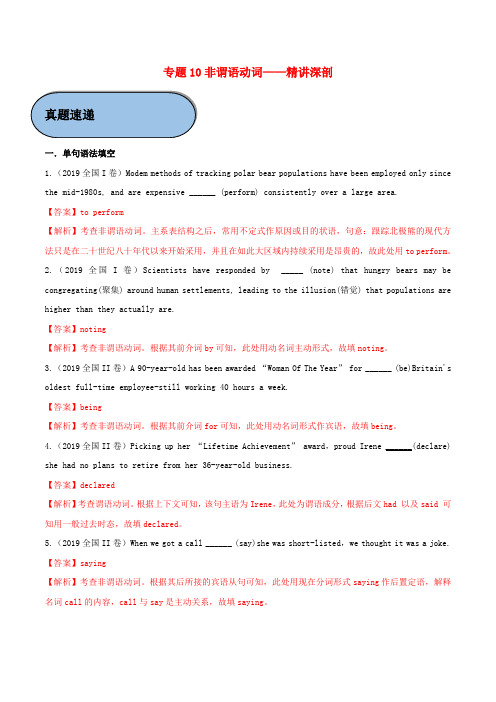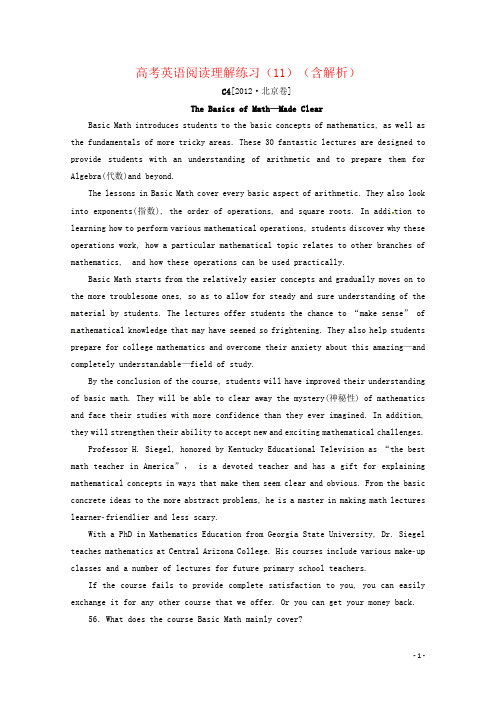2019高考英语词汇(11)练习(含解析)
2019年高考试题-英语(上海卷)解析版

2019 年高考试题 - 英语(上海卷)解析版注意事项:认真阅读理解,结合历年的真题,总结经验,查找不足!重在审题,多思考,多理解!无论是单选、多选还是论述题,最重要的就是看清题意。
在论述题中,问题大多具有委婉性,尤其是历年真题部分,在给考生较大发挥空间的同时也大大增加了考试难度。
考生要认真阅读题目中提供的有限材料,明确考察要点,最大限度的挖掘材料中的有效信息,建议考生答题时用笔将重点勾画出来,方便反复细读。
只有经过仔细推敲,揣摩命题老师的意图,积极联想知识点,分析答题角度,才能够将考点锁定,明确题意。
I.ListeningComprehensionSectionADirections: InsectionA,youwillheartenshortconversationsbetweentwospeakers.Atthee ndofeachconversation,aquestionwillbeaskedaboutwhatwassaid.Theconversationandthe questionwillbespokenonlyonce.Afteryouhearaconversationandthequestionaboutit,rea dthefourpossibleanswersonyourpaper,anddecidewhichoneisthebestanswertothequestio nyouhaveheard.1.W:Canyoudescribewhatyoudo?M:Iwashofficebuildingwindows.Igohighupinthebaskettoreachthewindows.Q:Whatistheman'sjob?A.Abasketballplayer.B.Alaundryworker.C.Awindowwasher.D.Arockclimber【答案】 C.Awindowwasher.【解析】这是一道事实细节题。
2020年高考英语必考点全梳理专题11-简单句与并列句(精讲深剖)附答案

专题11 简单句与并列句——精讲深剖真题速递一.单句语法填空1.(2019全国II卷)I work not because I have to, ______ because I want to.”【答案】but【解析】考查并列连词。
根据句意逻辑可知,此处为转折关系,句意:我工作不是因为我不得不做,而是因为我想做。
此处用but与前文not 呼应,构成“不是…而是…”之意,故填but。
2.(2018·全国Ⅲ卷)When the gorillas and I frightened each other, I was just glad to find them alive. True to a gorilla's unaggressive nature, the huge animal________ (mean) me no real harm.【答案】meant【解析】考查简单句。
根据语境可知此处叙述的是发生在过去的事情,应该用一般过去时,故填meant。
3.(2017·全国Ⅱ卷)This included digging up the road, ________ (lay) the track and then building a strong roof over the top.【答案】laying【解析】laying和句中的digging up, building并列。
句意:这包括在公路上挖掘,铺设轨道,然后在顶部建造一个坚固的屋顶。
4.(2016·全国Ⅲ卷)Skilled workers also combine various hardwoods and metal ________ (create) special designs. 【答案】to create【解析】考查简单句。
句意:熟练的工人还会把各种硬质木材和金属组合起来以创作独特的样式。
高考英语真题专项汇编卷(2017-2019):知识点11 短文改错

高考英语真题专项汇编卷(2017-2019):知识点11 短文改错1、假定英语课上老师要求同桌之间交换修改作文,请你修改你同桌写的以下作文。
文中共有10处语言错误,每句中最多有两处。
每处错误仅涉及一个单词的增加、删除或修改。
增加:在缺词处加一个漏字符号(∧),并在其下面写出该加的词。
删除:把多余的词用斜线(\)划掉。
修改:在错的词下划一横线,并在该词下面写出修改后的词。
注意:1.每处错误及其修改均仅限一词;2.只允许修改10处,多者(从第11处起)不计分。
I became interesting in playing football thanks to a small accident. One afternoon where I was in primary school, I was walking by the school playground. Suddenly football feel just in front of me but almost hit me. I stopped the ball and kicked it hardly back to the playground. To everyone`s surprising, the ball went into the net. All the football player on the playground cheered loudly, say that I had a talent for football. From now on, I started to play my football with classmates after school. I am a good player now.2、假定英语课上老师要求同桌之间交换修改作文,请你修改你同桌写的以下作文。
文中共有10处语言错误,每句中最多有两处。
2019年高考英语阅读理解一轮练11含解析

2019年高考英语阅读理解一轮练(十一)李仕才AOPENINGS AND PREVIEWSAntlia PneumaticaIn a new play by Anne Washburn, directed by Ken Rus Schmoll, a group of estranged friends gather at a Texas farm house to bury one of their peers. (Peter Jay Sharp, 416 W. 42nd St. 212-279-4200. In previews.)Bright StarSteve Martin and Edie Brickell wrote this bluegrass-and-Americana musical, in which a magazine editor meets a soldier returning from the Second World War. Walter Bobbie directs. (Cort, 138 W. 48th St. 212-239-6200. In previews.)The CrucibleIvo van Hove directs Arthur Miller’s classic drama about the Salem witch trials, starring Saoirse Ronan, Ben Whishaw, Ciaran Hinds, and Sophie Okonedo. (Walter Kerr, 219 W. 48th St. 212-239-6200. In previews.)Dry PowderJohn Kra sinski, Claire Danes, and Hank Azaria star in Sarah Burgess’s play, in which an executive at a private-equity firm (私人股本公司) tries to rebound from a P.R. disaster. Thomas Kail directs. (Public, 425 LafayetteSt. 212-967-7555. In previews. Opens Oct. 28, 2017)The FatherFrank Langella stars in a play by the French writer Florian Zeller, translated by Christopher Hampton and directed by Doug Hughes for Manhattan Theatre Club, about an eighty-year-old man who is losing his grip on his own life story. (Samuel J. Friedman, 261 W. 47th St. 212-239-6200. Previews begin Oct. 28, 2017)1.If you’re interested in American music, where can you get entertained?A. Peter Jay Sharp, 416 W. 42nd St.B. Cort, 138 W. 48th St.C. Walter Kerr, 219 W. 48th St.D. Public, 425 Lafayette St.2.If you want to preview a play now, which of the following is not available?A. Bright StarB. The CrucibleC. Dry PowderD. The Father3.The author’s purpose of writing the passage is to ________ .A. informB. entertainC. persuadeD. describe【文章大意】本文是一篇应用文,主要是向读者介绍四部影片。
2019高考英语(九月)题型整合练(含解析)(打包11套)

2019高考英语(九月)题型整合练(1)一、阅读理解。
ALife can be so wonderful, full of adventure and joy. It can also be full of challenges, setbacks(挫折) and heartbreaks. Whatever our circumstances, we generally still have dreams, hopes and desires that little something more we want for ourselves and our loved ones. Yet knowing we can have more can also create a problem, because when we go to change the way we do things, up come the old patterns and pitfalls(陷阱) that stopped us from seeking what we wanted in the first place.This tension between what we feel we can have and what we’re seemingly able to have is the niggling(烦人的)suffering, the anxiety we feel. This is where we usually think it’s easier to just give up. But we’re never meant to let go of part of us that knows we can have more. The intelligence behind that knowing is us — the real us. It’s the part that believes in the life and its possibilities. If you drop that, you begin to feel a little "dead" inside because you’re dropping "you".So, if we have this capability but somehow life seems to keep us stuck,how do we break these patterns?Decide on a new course and make one decision at a time. This is good advice for a new adventure or just getting through today’s challenges.While, deep down, we know we can do it, our mind — or the minds of those close to us — usually says we can’t. That isn’t a reason to stop, it’s just the mind, that little man or woman on your shoulder, trying to talk you out of something again. It has done it many times before. It’s all about start ing simple and doing it now.Decide and act before overthinking. When you do this you may feel a little, or large, release from the jail of your mind and you’ll be on your way.1. It can be inferred from the first two paragraphs that we should ________.A. slow down and live a simple lifeB. be careful when we choose to changeC. stick to our dreams under any circumstancesD. be content with what we already have2. What is the key to breaking the old patterns?A. To focus on every detail.B. To decide and take immediate action.C. To listen to those close to us.D. To think twice before we act.3. Which of the following best explains the underlined part in the last paragraph?A. Escape from your punishment.B. Realization of your dreams.C. Freedom from your tension.D. Reduction of your expectations.4. What does the author intend to tell us?A. It’s easier than we think to get what we want.B. It’s important to learn to accept sufferings in life.C. It’s impractical to change our way of thinking.D. It’s harder than we expect to follow a new course.【文章大意】本文是一篇议论文。
高考英语全国卷2019 I 完形填空翻译与解析

全国卷完形填空真题解析2019 I重点单词短语:attempt/ə'tempt/ vt.尝试;企图attempt to do sth企图做某事destination /ˌdestɪˈneɪʃn/ n.目的地describe sb/sth as sth 把某人或某事描述成pure/pjʊə/ adj.纯的;纯粹的;纯洁的( purer, purest )disturbing /dɪˈstɜ:bɪŋ/ adj. 引起烦恼的;令人不安的tons of 大量的,许多的(后接可数名词复数或不可数名词)path/pɑ:θ/n.小路,小径;路线,道路authority/ɔː'θɒrɪtɪ/ n.权威;权力(pl)当局;官方the efforts made by... …所做的努力make an effort作出努力effort/ˈefət/n. 努力signific ant/sɪg'nɪfɪkənt/ adj. 显著的,有重大意义的;别有含义的,意味深长的signific ance/sɪg'nɪfɪkəns/ n.意义;意思;重要性;重要意义evident /'evɪdənt/ adj.明显的;明白的evidence /ˈevɪdəns/ n. 证据;证词abrupt ly/ə'brʌptli/ adv. 突然地;唐突地abrupt adj.突然的;意外的give way to 被……替代;给……让路,让位于……shade/ʃeɪd/ n.浓淡深浅,色度arctic-like zone 类似北极的地带reputation /ˌrepju'teɪʃən/ n.名声,名誉reputation as sth. …的荣誉deserve the reputation 名不虚传line n.行;排lines of tourist s游客队伍ruin /'ru:ɪn/ vt.毁灭,破坏;使破产n. 毁灭,破坏;破产,一无所有;废墟the opposite to be true事实恰好相反opposite /ˈɔpəzɪt/ adj.相对的;相反的prep. 在…对面解析:Every year about 40,000 people attempt to climb Kilimanjaro, the highest mountain in Africa. They41 with them lots of waste. The42 might damage the beauty of the place. The glaciers(冰川)are disappearing, changing the43 of Kilimanjaro.每年约有4万人试图攀登非洲最高的山峰乞力马扎罗。
高考英语必考点专题10非谓语动词(精讲深剖)(含解析)

专题10非谓语动词——精讲深剖一.单句语法填空1.(2019全国I卷)Modem methods of tracking polar bear populations have been employed only since the mid-1980s, and are expensive ______ (perform) consistently over a large area.【答案】to perform【解析】考查非谓语动词。
主系表结构之后,常用不定式作原因或目的状语,句意:跟踪北极熊的现代方法只是在二十世纪八十年代以来开始采用,并且在如此大区域内持续采用是昂贵的,故此处用to perform。
2.(2019全国I卷)Scientists have responded by _____ (note) that hungry bears may be congregating(聚集) around human settlements, leading to the illusion(错觉) that populations are higher than they actually are.【答案】noting【解析】考查非谓语动词。
根据其前介词by可知,此处用动名词主动形式,故填noting。
3.(2019全国II卷)A 90-year-old has been awarded “Woman Of The Year” for ______ (be)Britain's oldest full-time employee-still working 40 hours a week.【答案】being【解析】考查非谓语动词。
根据其前介词for可知,此处用动名词形式作宾语,故填being。
4.(2019全国II卷)Picking up her “Lifetime Achievement” award,proud Irene ______(declare) she had no plans to retire from her 36-year-old business.【答案】declared【解析】考查谓语动词。
高考英语阅读理解练习(11)(含解析)

高考英语阅读理解练习(11)(含解析)C4[2012·北京卷]The Basics of Math—Made ClearBasic Math introduces students to the basic concepts of mathematics, as well as the fundamentals of more tricky areas. These 30 fantastic lectures are designed to provide students with an understanding of arithmetic and to prepare them for Algebra(代数)and beyond.The lessons in Basic Math cover every basic aspect of arithmetic. They also look into exponents(指数), the order of operations, and square roots. In addi tion to learning how to perform various mathematical operations, students discover why these operations work, how a particular mathematical topic relates to other branches of mathematics, and how these operations can be used practically.Basic Math starts from the relatively easier concepts and gradually moves on to the more troublesome ones, so as to allow for steady and sure understanding of the material by students. The lectures offer students the chance to “make sense” of m athematical knowledge that may have seemed so frightening. They also help students prepare for college mathematics and overcome their anxiety about this amazing—and completely understan dable—field of study.By the conclusion of the course, students will have improved their understanding of basic math. They will be able to clear away the mystery(神秘性) of mathematics and face their studies with more confidence than they ever imagined. In addition, they will strengthen their ability to accept new and exciting mathematical challenges.Professor H. Siegel, honored by Ken tucky Educational Television as “the best math teacher in America”, is a devoted teacher and has a gift for explaining mathematical concepts in ways that make them seem clear and obvious. From the basic concrete ideas to the more abstract problems, he is a master in making math lectures learnerfriendlier and less scary.With a PhD in Mathematics Education from Georgia State University, Dr. Siegel teaches mathematics at Central Arizona College. His courses include various makeup classes and a number of lectures for future primary school teachers.If the course fails to provide complete satisfaction to you, you can easily exchange it for any other course that we offer. Or you can get your money back.56.What does the course Basic Math mainly cover?A.Algebra.B.College Mathematics.C.Arithmetic.D.Mathematics Education.57.What benefits can students expect from Basic Math?A.Stronger imaginative ability.B.Additional presentation skills.C.More mathematical confidence.D.Greater chances of becoming teachers.58.What can we learn about Professor H.Siegel?A.He is a guest lecturer at Kentucky Educational Television.B.He is to deliver 30 lectures in Basic Math.C.He works in Georgia State University.D.He specializes in training teachers.59.Where is the passage most likely to have been taken from?A.A news report.B.A book review.C.A lesson plan.D.An advertisement.【要点综述】本文主要介绍了一个数学课程,从课程内容、功能用途、预期目标、主讲人等方面做了详细说明,是一则招生广告。
- 1、下载文档前请自行甄别文档内容的完整性,平台不提供额外的编辑、内容补充、找答案等附加服务。
- 2、"仅部分预览"的文档,不可在线预览部分如存在完整性等问题,可反馈申请退款(可完整预览的文档不适用该条件!)。
- 3、如文档侵犯您的权益,请联系客服反馈,我们会尽快为您处理(人工客服工作时间:9:00-18:30)。
亲爱的同学:这份试卷将再次记录你的自信、沉着、智慧和收获,我们一直投给你信任的目光……词汇(11)李仕才复习:1、核心单词2、重点短语3、写作句式4、我读我练(词汇应用、句式仿写)【单句单词语法填空】1. An average of just 18.75 cm of rain fell last year, making______the driest year since California became a state in 1850.答案:it 句意为:去年平均降雨量仅18.75厘米,是自1850年加利福尼亚州建州以来最干旱的一年。
根据句意可知,设空处指代上文中的last year。
故填it。
2. When parents bring home a pet, their child gladly bathes ________ and brushes its fur.答案:it 句意为:当父母把一个宠物带回家时,他们的孩子高兴地给它洗澡并刷毛。
根据句意可知,it指代上文中的a pet。
3.(2014·陕西,21改编)I'd appreciate ______ if you could let me know in advance whether or not you will come.答案:it 句意:如果你能提前让我知道你是否会来,我将很感激。
I'd appreciate it if...“如果……我将不胜感激”,这是appreciate的固定句式,it作形式宾语。
4.(2013·新课标Ⅱ,14改编)It's an eitheror situation—we can buy a new car this year or we can go on holiday but we can't do________.答案:both not...both“并非两者都”,为部分否定。
5.(2013·山东,21改编)I've lived in New York and Chicago, but don't like ________ of them very much.答案:either 句意:我在纽约和芝加哥住过,但是这两个地方我都不是很喜欢。
either“两者中的任何一个”。
核心单词1.distribute vt. 分发,使分布2.disturb vt. 扰乱;打扰3.drawback n. 缺点,不利条件4.dustbin n. 垃圾箱5.dusty adj. 尘土般的,尘土多的6.eager adj. 渴望的,热切的cation n. 教育,培养8.effect n. 效果;作用9.effort n. 努力;艰难的尝试10.embarrass vt. 使窘迫,尴尬11.emergency n. 紧急情况(状态)12.employ vt. 雇佣13.encouragement n. 鼓励14.energetic adj. 精力充沛的,富有活力的,活跃的15.engine n. 发动机,引擎16.engineer n. 工程师;技师17.enjoyable adj. 愉快的;有趣的18.enlarge v. 扩大,扩展,扩充;放大19.enterprise n. 公司,企/事业单位20.entertainment n. 娱乐21.enthusiastic adj. 热情的,热心的22.environment n. 环境23.equality n. 平等24.equipment n. 装备,设备25.evident adj. 清楚的,显而易见的重点短语1.exchange...for... 以……换……exchange...with... 和……交换……in exchange (for) 作为(对……的)交换2.fit in 相适应;相融洽fit in with 与……合得来;适应3.focus on 集中精力于fix one’s attention on 将注意力集中在fix one’s eyes on 注意;凝视concentrate on 集中精力于pay attention to 注意【阅读理解】When I recently revealed to my friends, colleagues, and family members that I would be moving my family to Israel, the reactions were numerous and varied. Some people said it was an expected thing while others asked: Why now? What will you do?For me, making the move to Israel is the fulfillment of a dream that has lasted for my 47 years of life. I have always known that Israel is my home. Over the years Israel has been in my heart, but I have found a number of reasons to put off making it my permanent residence: kids, the economy, education...you name an excuse, and at some point I have probably used it.Truthfully, I believe that I was always just a little bit scared. And of course I still am, with the fear factor that is reported by the press surrounding the Israeli military and economy. However, it has come to the point when I have realized that for over 2 000 years we yearned for this land, and for 47 years I have denied the opportunity to make it my home. I am finally ready to fully grasp this opportunity.Over the years, I have always loved visiting Israel. I have traveled there with my family, and enjoyed introducing thousands of travelers to the country. All of these things that I have come to love about Israel as a tourist are because I get to love my home. And as far as waiting for the "perfect" condition under which to make aliyah, I believe the time is now!I have been asked many times if I am nervous about moving to Israel. Before I answer, I remember that we have overcome the Greeks, the Romans, the Russian killings, Hitler and the Holocaust(大屠杀), and the armies of seven countries.How can I not feel confident that I, and my family, will overcome any difficulties that may come our way? I am not worrying, complaining, crying, or fearing as I prepare to make aliyah. I am proud and excited to say that I am fulfilling a 47-year-old dream;I am going home.1.What does the author want to say in the passage?A. His dream is to come true after 47 years.B. It is a dilemma for him to return to Israel.C. He didn’t live a happy life in Israel.D. It is a latest trend to fulfill everyone’s dream.2.The author didn’t return to Israel before because .A. his children mainly held him backB. he failed to get determinedC. he didn’t save enough moneyD. he hoped to finish his education3.What does the underlined part "make aliyah" mean in the passage?A. To return to Israel.B. To make a decision.C. To live happily.D. To catch a chance.4.It can be inferred from the passage that .A. the author will be happy to meet his relatives in IsraelB. Israel is a familiar word but a strange place for the authorC. the Israeli suffered a lot in the historyD. Israel is still a place between war and chaos【文章大意】本文是一篇讲述个人经历的记叙文。
